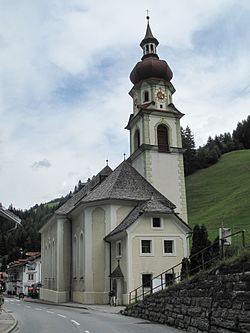Gries am Brenner
| Gries am Brenner | ||
|---|---|---|
 |
||
|
||
| Location within Austria | ||
| Coordinates: 47°02′00″N 11°28′00″E / 47.03333°N 11.46667°ECoordinates: 47°02′00″N 11°28′00″E / 47.03333°N 11.46667°E | ||
| Country | Austria | |
| State | Tyrol | |
| District | Innsbruck Land | |
| Government | ||
| • Mayor | Karl Mühlsteiger (Offene Gemeindeliste Karl Mühlsteiger (OGKM)) | |
| Area | ||
| • Total | 55.79 km2 (21.54 sq mi) | |
| Elevation | 1,165 m (3,822 ft) | |
| Population (1 January 2016) | ||
| • Total | 1,329 | |
| • Density | 24/km2 (62/sq mi) | |
| Time zone | CET (UTC+1) | |
| • Summer (DST) | CEST (UTC+2) | |
| Postal code | 6156 | |
| Area code | 05274 | |
| Vehicle registration | IL | |
| Website | www.griesambrenner. tirol.gv.at |
|
Gries am Brenner is a municipality in the Wipptal in the southern district of Innsbruck-Land. The village consists of several hamlets.
Gries am Brenner is located at the entrance of the Obernbergtal on the western side of the Wipptal. Here the valley widens enough to accommodate the village, the River Sill and the B182 road; the Brenner Railway runs along the eastern side and the motorway A13 on the western, are on a higher level. Also the Lake Brennersee lies on the area of the municipality.
Gries during the Roman Empire was an important passageway station to the south, but the final settlement is in the late Middle Ages; the oldest ones, date back to the pre-Roman age, are at Nößlach and Vinader. The road was traveled by traders, travelers and pilgrims, and along the route some hamlets were built. Among the various personalities who, at various times, have passed through here, remember Charlemagne, Albrecht Drauser, Goethe and Mozart. To protect the road in the territory of Gries was built a fort, but in 1241 a conflict arose between Albert III County of Tyrol and the Diocese of Brixen, which imposed the demolition. Meinhard, Duke of Carinthia built in 1287 at Leug, just south of Gries, a fortress for the use as customs duty.
Frederick IV, Duke of Austria built nearby a small church that had, between 1461 and 1811, a own vicarate. Maximilian I, Holy Roman Emperor was a regular visitor of Gries since the territory was full of game, during his hunting expeditions stayed at the "Weißes Rößle” Inn. Gries benefited, until 1560, the wealth created by the mines in the nearby Obernbergtal, having on its territory warehouses and workshops for the manufacture of silver. In 1809 during the Tyrolean Rebellion the General Lefebvre, in retaliation for the defeat suffered by the Saxons troops near Mules, destroyed the station customs at Leug which was definitively closed in 1815. After the second world war, for some years, the coal mine was exploited to the Nößlachjoch. Following the completion of the Brenner Motorway, and the consequential diversion of the traffic, the village has turned into a pretty quiet place, with a small number of tourists. The hotels, along the way, are here since centuries because of the nature of Gries as a border place.
...
Wikipedia



